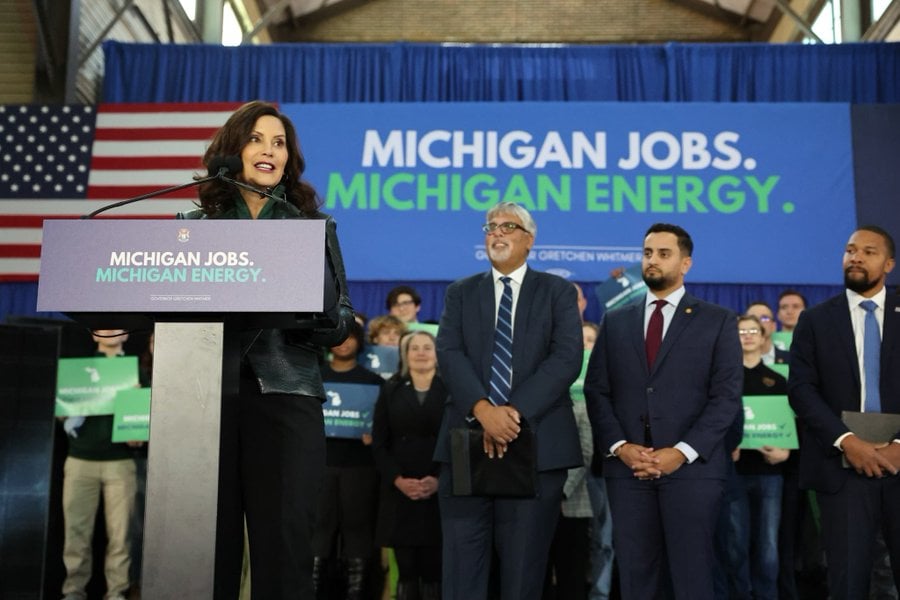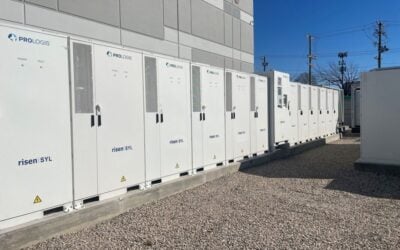
The Michigan Public Service Commission (MPSC) has approved a bid made by the DTE Electric Company to replace a coal-fired power plant in Michigan with battery storage.
DTE has already retired its Trenton Channel power plant in Wayne County, and the MSPC has authorised the company to demolish two smokestacks at the idle factory, and construct a 220MW/800MWh lithium-ion battery energy storage system (BESS) in their place.
Enjoy 12 months of exclusive analysis
- Regular insight and analysis of the industry’s biggest developments
- In-depth interviews with the industry’s leading figures
- Annual digital subscription to the PV Tech Power journal
- Discounts on Solar Media’s portfolio of events, in-person and virtual
This storage project will cost up to US$460 million, according to the commission, and will be an important step as the state looks to realise its ambitious energy storage goals. Last November, governor Gretchen Whitmer signed both climate and storage targets into state law, including the commissioning of 2.5GW of energy storage capacity by 2030, becoming the tenth US state to make a binding commitment to storage capacity.
At the time the legislation became law, Jeff Bishop, then-CEO of grid-scale battery storage developer Key Capture Energy, told our sister site Energy-Storage.news that the Midwest region “needs storage more than anywhere” in the US.
Hailing the state legislature and governor Whitmer for taking a lead on clean energy, the CEO said his company has a project pipeline of 700MW in development in Michigan, as well as others in the wider Midwest Independent System Operator (MISO) grid territory. This was, he said, down to the fundamental drivers for storage in the region.
The Midwest Independent System Operator (MISO) is responsible for managing the grid across all or part of 15 US states including Michigan, plus Manitoba in Canada.
“Obviously, MISO overall, just needs more capacity. Looking at all the coal plant retirements, even the natural gas plant retirements that are in Integrated Resource Plans [published regularly by utilities], and they just need more capacity. That’s where storage can really shine,” Bishop said in an interview with Energy-Storage.news Premium in December.
The laws passed last year will require utilities to acquire 15% of their electricity from renewable sources and for the state to meet electricity demand with 100% clean energy by 2040. The presence of more robust grid infrastructure assets such as energy storage will aid that effort and perhaps even help clean power projects be seen as less inherently unreliable than other energy sources.
Consumers Energy’s biomass PPA-to-solar PV plan rejected
However, the regulatory body has rejected two applications made by local utility Consumers Energy to terminate power purchase agreements (PPAs) in place with biomass producers in the state, and replace them with power generated from solar.
The utility made separate requests to cancel the two PPAs. One involves a deal signed with National Energy of Lincoln for an 18MW biomass plant in the state, that planned to run until 2027. Consumers, however, sought to end the deal early, which would have triggered a closure of the plant in May this year, and replace the power generated with a new solar plant, which would have a capacity of 33.6MW.
The other deal involves the 40MW Cadillac biomass plant, operated by the Cogeneration Michigan Associates Limited Partnership, which Consumers aimed to end by May this year. The utility proposed replacing this biomass plant with another new solar facility, this one with a capacity of 67MW, but MPSC rejected both proposals, arguing that the reliance on a variable power source, such as solar, posed an “unacceptable level of risk” for the state’s energy grid.
The commission suggested that the two solar facilities would not be able to make up the power produced by the biomass plants, forcing the off-takers to acquire their electricity from other markets.
The commission approved Consumers’ proposal for a PPA pertaining to the 300MW Freshwater solar project, which is currently being constructed by Ranger Power.
Additional reporting by Andy Colthorpe.
This story appeared in its original form on PV Tech.
Energy-Storage.news’ publisher Solar Media is hosting the 6th Energy Storage Summit USA this week, 19-20 March 2024 in Austin, Texas. Featuring a packed programme of panels, presentations and fireside chats from industry leaders focusing on accelerating the market for energy storage across the country. For more information, go to the website.






